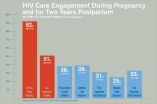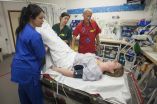(Press-News.org) Pregnancy could be a turning point for HIV-infected women, when they have the opportunity to manage their infection, prevent transmission to their new baby and enter a long-term pattern of maintenance of HIV care after giving birth--but most HIV-infected women aren't getting that chance. That is the major message from a pair of new studies in Philadelphia, one published early online this month in the journal Clinical Infectious Diseases, and the other published in July in PLOS ONE.
The studies, led by a team of researchers from Drexel University and the Philadelphia Department of Public Health (PDPH), are the first to describe the HIV care continuum postpartum and the first to use population-based data to evaluate viral suppression rates of HIV-infected pregnant women at delivery. Both studies were based on the review of medical records of all HIV-infected women delivering babies in Philadelphia over several years (2005-2011 and 2005-2013, respectively).
In the PLOS ONE paper, the researchers report that women's engagement in prenatal care was poorer than expected. Only about a third of women received adequate prenatal care, a third received an intermediate level of care, and a third received prenatal care that was inadequate.
At delivery, that care disparity manifested with only about half of women having their HIV viral levels suppressed--an outcome that physicians and public health officials target to prevent transmission of the infection.
"We had expected the viral suppression rate to be much better at delivery because there is a known infrastructure to prevent mother-to-child transmission of HIV," said Florence Momplaisir, MD, MSHP, an assistant professor at the Drexel University College of Medicine who was lead author of the PLOS ONE study and senior author of the Clinical Infectious Diseases study.
In the latter study, Momplaisir and colleagues took a closer look at the pregnant women's HIV care during pregnancy and for two years postpartum. They found that HIV care during pregnancy was robust, with 92 percent of women receiving antiretroviral therapy or an HIV lab test during that time. But in the postpartum period, women were far less engaged in HIV care, with only 38 percent of women engaged in care within 90 days after giving birth.
Another major finding: "When women connected with care soon after delivery, they were much more likely to remain in care up to two years afterward," said Joëlla Adams, MPH, lead author of the Clinical Infectious Diseases study.
Adams, who now works at the Philadelphia Department of Public Health, led much of the data analysis for this study as an MPH student completing a community-based master's project for the Drexel University School of Public Health at PDPH in 2014. Adams' project mentors in addition to Momplaisir, Yvonne Michael, ScD, an associate professor at the Drexel University School of Public Health, and Kathleen Brady, MD, MSCE, medical director of the AIDS Activities Coordinating Office of PDPH, were among the co-authors.
"Women engaged in care within 90 days of delivery were 11 times as likely to be retained in care and twice as likely to be virally suppressed at a year postpartum," said Momplaisir. "This suggests there is a window of opportunity after delivery to establish lasting care."
The takeaway message, they say, is that HIV-infected women need better interventions and supports to help keep them in care during that critical window, among other times, including before becoming pregnant.
Momplaisir's continuing studies aim to better understand women's needs and inform such interventions. She was recently selected as a scholar of the Harold Amos Medical Faculty Development Program of the Robert Wood Johnson Foundation to understand how personal factors including women's social norms, perceived beliefs, social support and personal barriers such as untreated mental health, substance abuse, intimate partner violence, and health system factors, including whether women receive HIV and obstetric care together or separately, contribute to HIV outcomes. In addition, she received an Early Career Investigator Award from the International Maternal Pediatric Adolescent AIDS Clinical Trial Network (IMPAACT) to use data from an existing IMPAACT trial to understand how depression affects the quality of HIV care that pregnant and postpartum women receive.
"Although we have made enormous achievements in reducing mother-to-child transmission of HIV in the US, there is more work to be done to completely eliminate that risk and to ensure that HIV-infected women of child bearing age are living healthy and productive lives," Momplaisir said.
INFORMATION:
Link to paper in Clinical Infectious Diseases: http://dx.doi.org/10.1093/cid/civ678
Link to paper in PLOS ONE: http://journals.plos.org/plosone/article?id=10.1371/journal.pone.0132262
A team from the University of Illinois at Urbana-Champaign and Indiana University combined two techniques to determine the structure of cyanostar, a new abiological molecule that captures unwanted negative ions in solutions.
When Semin Lee, a chemist and Beckman Institute postdoctoral fellow at Illinois, first created cyanostar at Indiana University, he knew the chemical properties, but couldn't determine the precise atomical structure. Lee synthesized cyanostar for its unique ability to bind with large, negatively charged ions, which could have applications such as ...
Many political leaders, scientists, educators and parents believe that failure is the best teacher.
Scientists have long understood that the brain has two ways of learning. One is avoidance learning, which is a punishing, negative experience that trains the brain to avoid repeating mistakes. The other is reward-based learning, a positive, reinforcing experience in which the brain feels rewarded for reaching the right answer.
A new MRI study by USC and a group of international researchers has found that having the opportunity to learn from failure can turn it into ...
Since the early days of fertility treatment, women undergoing IVF treatment have had to place a hormonal gel in their vagina on a daily basis for at least 14 days after embryo transfer. The hormone is necessary to increase the chances of pregnancy, but it may also cause some side effects in the form of irritation and leaky discharge.
However, the results of a new scientific study suggest that women will be able to avoid this kind of discomfort in the future.
"Fertility treatment is a physical and mental challenge for childless couples. The daily treatment with hormonal ...
Researchers at The Australian National University (ANU) and The University of Sydney have developed a world-first radio-tracking drone to locate radio-tagged wildlife.
Lead researcher Dr Debbie Saunders from the ANU Fenner School of Environment and Society said the drones have successfully detected tiny radio transmitters weighing as little as one gram. The system has been tested by tracking bettongs at the Mulligan's Flat woodland sanctuary in Canberra.
"The small aerial robot will allow researchers to more rapidly and accurately find tagged wildlife, gain insights into ...
A research team at Linköping University, together with colleagues in Europe and the United States, has shown that at extremely high pressure even the innermost electrons in the atomic nuclei of the metal osmium begin to interact with each other, a phenomenon never witnessed before. The findings have been published in Nature.
"If we know more about how a matter works, we will be in a better position to develop materials that withstand extreme conditions. In research we're constantly making advances, but in this case we've taken a giant leap", says Igor Abrikosov, ...
A new £6.65 million grant for research aimed at accelerating the discovery and application of new advanced materials for the energy sector was announced today by the Engineering and Physical Sciences Research Council (EPSRC).
The grant, awarded to a team led by Professor Matthew Rosseinsky of the University of Liverpool, will support a programme, Integration of Computation and Experiment for Accelerated Materials Discovery.
Professor Rosseinsky will head up an expert team at Liverpool and University College London that will work to tackle the challenge of designing ...
Noroviruses are the predominant cause of gastroenteritis outbreaks in community settings such as hospitals, cruise ships, and schools. The virus is extremely contagious and is mostly transmitted via "fecal-oral-route", i.e., through contaminated hands or contaminated food. Symptoms include violent and sudden onset of diarrhea, vomiting, and nausea.
"It is therefore important to provide a safe and harmless disinfectant against human norovirus," explains Grant Hansman, head of CHS junior research group at the German Cancer Research Center noroviruses and the University ...
A simple, safe and cost-free modification to a physical technique used to treat patients in the emergency department with an abnormally fast heart rhythm could improve its effectiveness by more than a quarter, according to a study published in The Lancet today (25 August 2015).
An abnormally fast heart rhythm, also called supraventricular tachycardia, can be distressing for patients and many come to emergency departments for treatment. Symptoms can include chest pain, light-headedness, dizziness and breathlessness. Episodes can last from a few seconds or, in extreme cases, ...
This news release is available in German. Trillions of bacteria populate the human gut - which makes them more common than any other cells in our body. The composition of this bacterial population is very variable and influenced by our diet. Diseases, but also antibiotic treatments can induce significant shifts in this equilibrium. If entire bacterial groups suddenly multiply heavily, critical situations occur. They damage the intestinal tissue and cause inflammations. How such shifts are triggered largely remained a mystery. Physiologists from the University of Zurich ...
This news release is available in German.
Root bacteria are known to form symbiotic relationships with plants by improving the plants' supply of nutrients. Yet as scientists at the Max Planck Institute for Chemical Ecology in Jena, Germany, found recently, the bacteria actually play a much more profound role. During field experiments in Utah, in the western USA, researchers discovered that the right mixture of soil microbiota directly influences the survival of Nicotiana attenuata, a species of wild tobacco. Plants that had been unable to establish a protective ...




